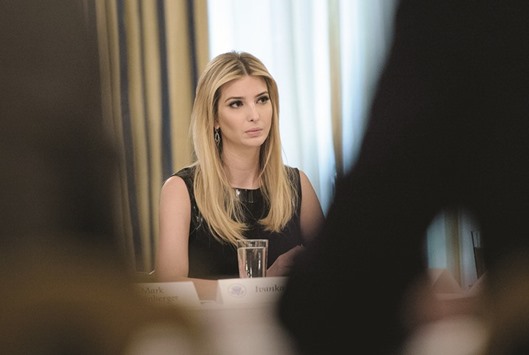The closest thing in the nascent administration of Donald J. Trump to a minister of culture is probably Ivanka Trump, who could be seen in a Broadway theatre seat last week, accompanying Canadian Prime Minister Justin Trudeau at a performance of Come From Away, an uplifting, if highly sentimental, musical celebrating small-town Canadian hospitality toward international airline passengers delayed there September 11, 2001. It’s the kind of show that makes you want to take a vacation in Newfoundland, and that’s why Trudeau was there. He saw the benefit for Canadian creative exports, Canadian tourism, Canadian international relations, Canadian influence at the United Nations, and on and on.
And did Ivanka Trump, an influential adviser to the president, her dad, intuit any of that from her seat? Did Trudeau whisper in her ear? If you care about the humanities, the arts and public broadcasting, those might be among the more important questions of the month.
If there is to be any retreat from the Trump administration’s stated budgetary desire to eliminate four crucial, grant-giving cultural agencies — the National Endowment for the Arts, the National Endowment for the Humanities, the Institute of Museum and Library Services, and the Corporation for Public Broadcasting — it is a fair assumption that Ivanka Trump will have been influential in persuading her father and his top advisers that it would actually be a bad idea to gut federal funding for American culture.
Not that there is much optimism that the agencies will survive. The arguments being frantically made on their behalf — they leverage private money; they support American plays, concertos, books, documentaries, museum exhibits and podcasts at crucial early stages of their development; they promote access, diversity, non-fake news, urban achievement and small-town self-examination; they protect profound thinking and artistry from the perfidy of the marketplace — have been made for years.
These arguments have failed to persuade the conservatives who now are in power. Even old-school right-wingers like George Will, who have not yet shown much love for the Trump way of doing business, have taken to their columns to denigrate the endowments, which are, of course, bastions of progressive thinking.
Who, aside from those who obviously benefit, is to take their part? Aside from Ivanka, who has the ear of Steve Bannon or Trump, himself, on this matter? How do the supporters of these agencies avoid playing Don Quixote? To whom can they turn?
In France, not that this would happen in France, listening would be the job of the minister of culture. This Cabinet-level position is in charge of promoting and protecting the arts (be they literary, architectural or cinematographic) in France and abroad. The job also involves maintaining the “French identity,” a phrase a Trump could appropriate and love.
In Sweden, not that this would happen in Sweden, the minister of culture is in charge of issues relating to culture, media, democracy, human rights at the national level, the national minorities and the language and culture of the Sami people.
In India, not that this would happen in India, the minister of culture’s task is to “develop and sustain ways and means through which the creative and aesthetic sensibilities of the people remain active and dynamic.”
I could go on. There are culture ministers, usually Cabinet-level offices, in Australia, Brazil, China, the Czech Republic, Egypt, Ethiopia, Japan, Macedonia, Myanmar, Qatar, South Africa, South Korea, Syria, Poland, Thailand, Turkey and the United Kingdom. Often, taking care of sports — cultural in every way — is affixed to the job. Often, taking care of religion and religious freedoms — cultural in every way — is affixed to the job. This massively increases the base of constituents and makes a crucial, shared-values link in people’s minds that many do not make on their own.
The problem is that this list does not include the United States. The independent agencies being targeted by Trump do not represent someone’s portfolio. And when you report to no-one within the government (beyond being nominated by the president and dealing with an advisory board), there is no-one protecting his or her turf (and their power base) when the knives come out for you.
Independence has its price. No manager with a slew of direct reports wants to see those reports ripped to shreds. Had Trump and Bannon had to deal with a minister of culture of their own creation, there might at least have been some pushback.
And when you have a minister of culture and a department of culture, then you might actually have a cultural policy — which, despite the inflammatory language to some, really means that you have an advanced civilisation thinking about itself. You have somebody in the kitchen protecting the creativity of citizens, preserving a nation’s heritage, making sure that expressions of persons who find themselves in a minority are not squelched.
You could argue these roles belong at the state level, or maybe even the city level, and, for sure, you can find people in New York and Chicago working along these lines. You could further argue that what some nations supervise at a governmental level, Americans prefer to be free and independent. And you would be making a fine argument there too. As you would if you said that the marketplace is strong enough to do some of these things on its own.
But it does not change the central point. The demonstrably important agencies that the Trump administration wants to cut are easy to shred because they are in no-one really important’s portfolio.
Except maybe Ivanka’s.
She’s into fashion, theatre, writing books, broadcasting. Culture. What is she going to do now for the soul of her country? —Chicago Tribune/TNS

.
